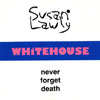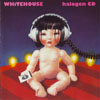 These two albums are two thirds of what I consider to be Whitehouse's most idiosyncratic, and therefore most compelling phase in their 26-plus years of activity. Culminating with 1995's Quality Time, which I have discussed at length before, the phase began here, with probably their most musical and understated (in relative terms, of course) works, respectively.
These two albums are two thirds of what I consider to be Whitehouse's most idiosyncratic, and therefore most compelling phase in their 26-plus years of activity. Culminating with 1995's Quality Time, which I have discussed at length before, the phase began here, with probably their most musical and understated (in relative terms, of course) works, respectively.
Quality Time was my initial exposure to Whitehouse, but by the time 1998's Mummy and Daddy was released, I had pretty much already digested much of their discography.Looking over their body of work, I see four distinct phases in their albums, from lyrics to vocals to the noises that which accompanies them.
The first phase, beginning with 1980's Birthdeath Experience up until 1983's legendary Right to Kill perhaps shows their greatest and most productive evolution.At that point, consisting of William Bennett and whomever he was acquainted with at that time (including Steve Stapleton for a few live performances), the band went from an atonal anomaly: in a modern context, Birthdeath Experience and Total Sex sound almost quaint; to a violent monstrosity:New Britain and Right to Kill are just as powerful and disturbing 30 years later.
The "second coming" as it was heralded at the time began with 1985's Great White Death and saw the band as a power trio of sorts:Bennett in the lead, backed by author Peter Sotos and Kevin Tomkins (then formally, and now once again currently of Sutcliffe Jugend).For better or worse, this is the album (and era) that they have been pigeonholed from:the once buried and inhumanly distorted vocals were brought up-front, coupled with lyrical content centered on aggressive, almost misogynistic sexuality.The sound and approach stayed rather consistent up through 1990's Thank Your Lucky Stars and 1992's Twice Is Not Enough, and seemed to edge into self-parody and humor at times: I have always had problems taking the David Tibet co-written title track from the former with any kind of seriousness.
Moving ahead, the fourth era is one of vicious digital noise that began with Mummy and Daddy and lasting through Asceticists 2006; eventually defined by untreated, but ranting, berating vocals traded off between Philip Best and William Bennett like two deranged psychotherapists to brilliant effect, and also a period of greater experimentation (sound collage, spoken word, percussion, etc).
Going backwards, the third period of Whitehouse is the more diverse, idiosyncratic one. The phase began with 1992's Never Forget Death, ostensibly a William Bennett solo album:the meticulous studio recording documentation on the Susan Lawly site credits no one else except him and Ott Blumenkraft, who mostly works in far more conventional genres, as a co-producer.Perhaps it was that co-production, because the three long tracks that make up the bulk of the album hint occasionally at traditional electronic music, for example:the undulating synths behind the title track eventually lock into some sort of perverse approach to techno.Maybe this was one of the earliest appearances of DJ Benetti and his love of Italo Disco.
Vocally, there a balance between the first two phases:lots of effects, but still mostly intelligible lyrics, with less of an emphasis on the sex and more on the violence."Now Is The Time" combines lyrics from "Right to Kill" with references to Bret Easton Ellis’ American Psycho…at least that is the only reason I can fathom Bennett name-checking Huey Lewis, Genesis, and Whitney Houston, atop a droning electronic backing that again exhibits an oddly rhythmic quality and an overall almost pleasant structure, barring the occasional harsh feedback swell.
The high point of the album for me is "Asking For It," which begins as a rather calm, narrative-like lyrical structure that devolves into hysterical, but menacing screams and harsh condemnations by the end.This is paired with an aggressive, but not overly noisy synth rhythm that varies and fluctuates perfectly with the vocals to come together beautifully.For all the criticism of their work, this ten minute piece alone is anything but just random noise with screaming:it is tightly and as effectively constructed as any post-whatever genre's stab at an epic-length song, and likely better.
The album's closer, "Torture Chamber" was marked with a disclaimer on both the original CD pressing and its current form (as the second half of the Twice Is Not Enough Special Edition disc) that it was not to be played loudly. While that seems almost comical for a Whitehouse album, one play through of the track justifies the warning.Beginning as a pure noise piece, more in line with Hijokaidan or the Incapacitants, the volume spikes to absurd proportions in the final 30 seconds, most likely into and far past the maximum threshold for digital media.
samples:

The subsequent follow-up, 1994's Halogen is both a return to the old and a new direction.Once again Bennett is assisted by Peter Sotos lyrically, resulting in some of the more complex vocal themes up to that point, while the synths are just awash in a sort of gauzy reverb that smooths out the cleaner sound, likely due to the Steve Albini production.It is still by no means peaceful, but has a more introspective feel compared to their other work.The almost pleasant synth sounds from Never Forget Death are but gone, replaced by unique analog textures that would reappear splendidly on Quality Time.
"Lightning Struck My Dick," despite its sophomoric title, delves lyrically much deeper, pulling in social commentary into the prostitution-tinged lyrics, and I assume with input from Sotos, given the wording is rather consistent with his writing.The vocals are pretty low and somewhat buried amid the ripping cloth synthesizers and explosions, but understandable.Similar is the title track, which opens with warbling feedback that, a few decibels lower, could actually be beautiful sounding.Even when the guttural, chugging synth and sampled Thai pop songs pop up, it is pretty placid.However, about half way through it takes a decidedly sinister turn.
Interspersed amongst these are a few straight up noise pieces, "Movement 1994" (a call-back to New Britain's "Movement 1982" and later revisited as "Movement 2000"), is a monochromatic burst of white noise, with little in the way of variation or dynamics that is short enough to not outstay its welcome."Dictator", on the other hand, is a low frequency synth throb with piercing noise stabs on top, and largely indecipherable vocals shouted throughout.
The most significant departure from not only the album, but their entire catalog, is the closing "The Way It Will Be." It is a brief, melancholy ambient track with poetic, spoken words:"I should like to live forever/Suns may rise, and suns may set/But you and I shall never more return to Earth."It is unlike anything else they ever did, or would do again, which is one of the reasons it is so striking.
Whitehouse is one of those few long-standing projects that I can pretty much jump into their back catalog at any point and enjoy on any given day.Personal preferences may shift depending on mood, but I do not find any album to be bad or weak by any means.The third phase trilogy (Never Forget Death, Halogen, and Quality Time) just always seems the most overlooked and under-appreciated to me, with so much of the focus on their career focused on either being among the first "noise" bands (the first phase), or their sexualized lyrics in the mid to late 1980s.I know before I heard the entirety of Quality Time, I had a lot of negative preconceived notions about the band that, once I actually listened to them, were tossed away.Anyone who has demonized Whitehouse based on second-hand information should listen for themselves and make up their own mind.
samples:
 
Read More

